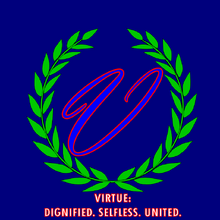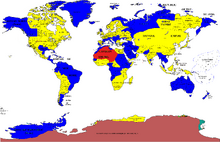The Virtue Federation is a global alliance containing more than half of the world's nations. It was

Virtue's official logo
founded on September 12, 1994 as a replacement organization for the United Nations, which had officially disbanded itself in the wake of the Third World War. Although not specifically stated so in its charter, in practice, Virtue's main goal is to oppose Rome and its alliance, believing the Romans to be the world's "aggressors" and citing as evidence the North American Union. Virtue's mission statement explicitly describes its organization as an "anti-imperialist" alliance and has, at many times, been critical of Roman policies and actions, although for the most part Virtue's activities have been purely diplomatic and not militant.

Virtue's simplified logo
Virtue also maintains among its core values strong ideals of upholding human rights across the world, maintaining peace in general and ending poverty worldwide, and often boasts of its many achievements in this regard. Critics- who are mostly Roman- assert that Virtue's many activities are a cover for its more unsavoury ends, believing Virtue's organs to be nothing more than props for its criminal elements and to maintain the power of its many dictators. However, due in no small part to Virtue's impressive public relations campaigning, not a single criticism has ever been proven to have merit.
Structure[]
Officially, Virtue has no leaders, with each member declared to be "equal in standing and status". However, the nations that belong to the Virtue Family are considered the Federation's de facto leaders. In 2021 the Family appointed an official leader, stylized as either the Patriarch or Matriarch depending on the gender of the leader. The first Matriarch is Byzantine Empress Alexia Comnenus.
The Virtue Federation is split into five different units, or "organs", each with their own set of administrators:
-Peace (which has the Protectors, Virtue’s peacekeeping wing, the Guards, Virtue’s crime-fighting wing, and the Honoured, Virtue's judiciary)
-Love (which has the Saviours, Virtue’s healthcare providers, the Givers, Virtue’s philanthropy wing, and the Providers, which operates Virtue’s “world bank”)
-Unity (the main branch of Virtue where all its members meet and determine policy, with the branch being a bicameral parliament- the lower level, where policy is formulated, being called the Friends and the upper level, where policy is approved, being called the Family)
-Respect (which featured the Advocates, Virtue’s human rights agency and the Ensurers, Virtue’s election monitoring agency)
Political Culture[]

Map of the world highlighting both Roman and Virtual territories. The territories that comprise the combined territory of the constituent states within Virtue are in yellow, while Rome and its allied states are in blue. Casara, officially unaligned, is in red.
Although across its member states exists a high degree of cultural differences and ideals, there are sets of ideas and structures that exist in various capacities across Virtue member states. These shared ideas are strongest within the Family, as they are often the ones who promote them. Even here, though, there are still considerable cultural differences between Family members.
The main component of Virtual culture is the adherence to the value of the family, in particular the ideas that one's relationships are framed in this manner. Monogamy and heteronormativity are strongly favoured for this reason, and individual forays into the various vices are looked down upon, (if not outright forbidden in some countries). This is because in Virtual culture the idea that one should put aside personal pleasures in order to take care of their family is very strong, with the selfish and the withdrawn frowned upon for their activities.
Nevertheless, Virtue's culture also strongly favours capitalism and individual determinism, with the idea that one should "never lose sight of their goals" and not to allow anyone- even if they are family- to prevent them from pursuing these goals. This is borne out of the idea that productive workers are happy workers, and it is seen that happiness can only be achieved if the person has an "aim". Thus, economic policies tend to be framed around this idea, with states tending to regulate to a degree where workers can still be provided with "livable" wages while not pursuing policies that restrict worker choices and the pursuit of opportunities.
Thus, socialism as a policy is rarely pursued by Virtual politicians, although some states embrace it more openly and readily than others. This is best embodied in a quote made by longtime English Foreign Minister Jack Kent, who stated in a 1996 speech that "there has to be a point where people have to want to help themselves". Welfare and other kinds of social assistance programs tend to be undervalued across Virtue, with health care and education costs being borne in some degree upon the citizens themselves.
Members[]
English Empire[]
These are polities that are officially recognized as provinces of the English monarchy. Each polity is administered under the rules and regulations of the English Parliament, headed by the Chancellor, with each polity contributing members to Parliament.
- Argentina
- England
- Japan
Virtue Family[]
These are countries that are recognized as being part of Virtue's highest level of organization, the Family. Each country is fully independent, although each have deals with each other and with countries within the Friends that outline varying degrees of economic and military partnership. The English Empire is also a part of the Family, but, for the purposes of the Treaty, was kept separate owing to its operational structure.
Virtue Friends[]
These are the countries that are recognized as being part of Virtue's second highest level of organization, the group of Friends. Each country is fully independent, although many countries have agreements with other nations within Virtue that outline varying degrees of economic and military partnership.
For a list of these countries, see the list of nations in the Treaty of Buffalo (2017). In that chart, under "Territory" they are listed under "Virtue".
